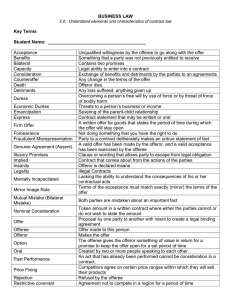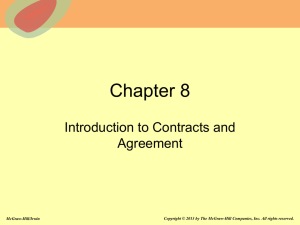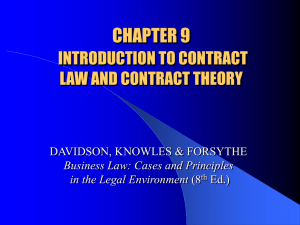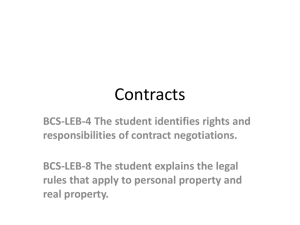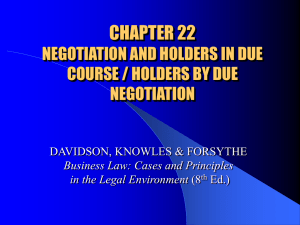CHAPTER 10 CONTRACTUAL AGREEMENT: MUTUAL ASSENT
advertisement
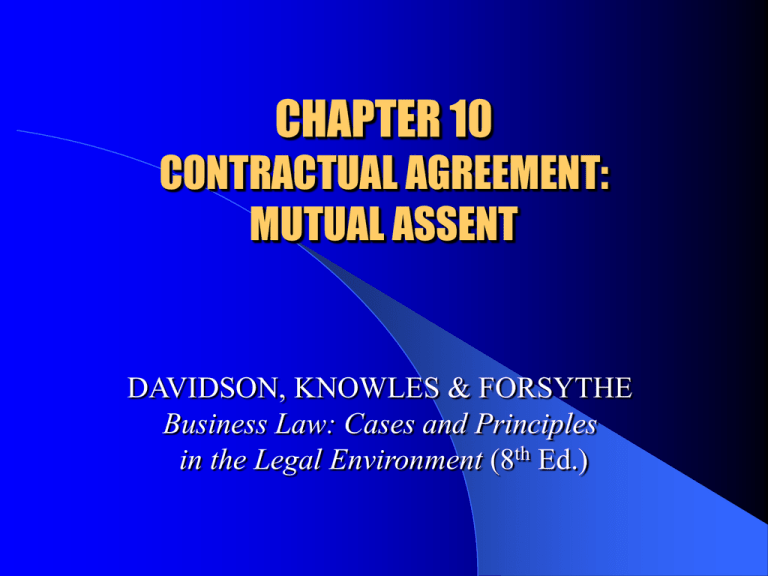
CHAPTER 10 CONTRACTUAL AGREEMENT: MUTUAL ASSENT DAVIDSON, KNOWLES & FORSYTHE Business Law: Cases and Principles in the Legal Environment (8th Ed.) BUSINESS LAW: Cases & Principles Davidson • Knowles • Forsythe 8th Ed. THE FIRST STEP IN CONTRACT FORMATION Valid offer by the offeror (the person making the offer). Valid acceptance by the offeree (the person to whom the offer is made). © 2004 West Legal Studies in Business A Division of Thomson Learning 2 BUSINESS LAW: Cases & Principles Davidson • Knowles • Forsythe 8th Ed. MUTUAL ASSENT Requires the assent of both parties to the agreement. Parties must agree exactly to the same terms and conditions. Without mutual assent no agreement comes into existence. © 2004 West Legal Studies in Business A Division of Thomson Learning 3 BUSINESS LAW: Cases & Principles Davidson • Knowles • Forsythe 8th Ed. THE OBJECTIVE THEORY OF CONTRACTS Offeror has the right to set the terms of the offer. Offeror controls method of acceptance by the offeree. Offeror must exhibit clear and present intent to offer. © 2004 West Legal Studies in Business A Division of Thomson Learning 4 BUSINESS LAW: Cases & Principles Davidson • Knowles • Forsythe 8th Ed. THE OBJECTIVE THEORY OF CONTRACTS Objective: observed and verified without being distorted by personal feelings and prejudices. Subjective: observed and verified through individual feelings and emotions. © 2004 West Legal Studies in Business A Division of Thomson Learning 5 BUSINESS LAW: Cases & Principles Davidson • Knowles • Forsythe 8th Ed. OFFER Clear Intention to Contract and Definiteness of the Offer – Statements of opinions, intentions, and preliminary negotiations lack definiteness. – Offer must be specific in all particulars. Advertisements and Auctions – Advertisements not valid offers because lack sufficient specificity. – In auctions the law treats the bidder as the offeror. © 2004 West Legal Studies in Business A Division of Thomson Learning 6 BUSINESS LAW: Cases & Principles Davidson • Knowles • Forsythe 8th Ed. OFFER Communication of the Offer to the Offeree. – Offeror must communicated the offer to the offeree to have legal effect. Duration of the Offer. Four methods for terminating an offer: – – – – Lapse; Revocation; Rejection; Acceptance. © 2004 West Legal Studies in Business A Division of Thomson Learning 7 BUSINESS LAW: Cases & Principles Davidson • Knowles • Forsythe 8th Ed. ACCEPTANCE Usual mode of terminating an offer. Offeror and offeree have arrived at an agreement. Binding contract exists. Involves the offeree’s assent to all the terms of the offer. The acceptance is oral, written, or implied. © 2004 West Legal Studies in Business A Division of Thomson Learning 8 BUSINESS LAW: Cases & Principles Davidson • Knowles • Forsythe 8th Ed. ACCEPTANCE Mirror-Image Rule: the acceptance must match, term by term, the provisions in the offer. Manner and Time of Acceptance: offeree must accept in exactly the mode specified or stipulated, by the offeror in the offer. Acceptance becomes legally effective at the time of dispatch. – “Mailbox Rule”. © 2004 West Legal Studies in Business A Division of Thomson Learning 9 BUSINESS LAW: Cases & Principles Davidson • Knowles • Forsythe 8th Ed. ACCEPTANCE Silence: overt act accompanies acceptance, which requires a clear intent to accept, prior dealings of parties may permit acceptance based on silence. Bilateral vs. Unilateral Contracts. – Bilateral Contracts the offeree accepts by either a direct communication to offeror or a counterpromise inferred from the offeree’s conduct. – Unilateral Contracts the offeree accepts by merely completing the act called for in the offer. © 2004 West Legal Studies in Business A Division of Thomson Learning 10


